法语与英语词汇中的伪同源词列表
英法单词相似原因分析

英法单词相似或相同的词源学分析我大学二外学的是法语,毕业后又多年从事语言学、语用学、翻译及大学英语等课程的教学,在教学中发现有不少英语单词与法语十分相似甚至完全相同,例如:patience,fatigue(fatigue),content,bureau,chaufeur,journal,spirit(esprit),obstinate(倔犟),bravo,combat,caviar,contradition,contribution(contribuer),vend(vendre),bourgeois,utilize(utiliser)等,这些单词在英语文章及教材中频繁出现,不由人不对之产生浓厚的兴趣,真不知两种不同的语言中何以有这么多类似或相同的词。
下文结合自己的教学经验,在众多英语教材中搜罗所见到的法语词,从词源学及语言历史发展的角度对英语法语单词相似或相同的原因进行分析研究,其目的在于帮助学生进一步认识语言发展变化的规律,提高其对外语学习的兴趣,从而更好地学习英语。
对这一现象略作分析。
英语法语中单词之所以类似或相同,有一个重要的原因是二者尽管属于不同的语系(英语属于日耳曼语系、法语则属于罗曼语系),但两种语言在形成的初期均不同程度地渗入了大量的拉丁语词。
首先谈谈法语。
今日的法国与比利时地区,位于古罗马的北方,被称为高卢。
公元前一世纪罗马大将恺撒征服高卢,大批罗马人随军队涌入高卢,他们与当地以克尔特为主的土人贸易,必需使用拉丁语,时间长了就形成了一种古拉丁语混杂克尔特语的难懂的、走了音的协和语,名为Sermo Rustics(土语),广泛流行于纪元世纪的全高卢境内,后脱俗为拉丁语。
公元三世纪,大批日耳曼人侵入高卢,其中哥特人在南方定居,有一支被称为法兰克人的日耳曼人侵入高卢北方,建立了政权,五世纪末又接受了基督教,这就是法国的初期。
前述的高卢罗马语被法兰克人接受,同时又复合法兰克人原有的日耳曼语,就产生了与古拉丁语越来越远的新语言,名为Lingue Romanica . 到了公元十世纪初,以丹麦人为主的北方民族侵入原高卢地区后,已改为法兰克区,因而在原有Franco-Gallo-Romans 语中又引入了北欧的斯堪地纳维亚语汇(主要是丹麦语),这就形成了早期法语,也就无怪法语中的拉丁词多了。
不符合英语同化的单词

不符合英语同化的单词
英语同化的概念是指当一个外来词汇被使用时,逐渐融入到英语中,并且符合英语的拼写规则、语法和发音规律。
然而,也存在一些不符合英语同化规则的单词,即那些继续保留其原始拼写和发音的外来词。
以下是一些不符合英语同化的单词的例子:
1. Café(咖啡馆):虽然在英语中我们通常将这个词翻译为coffee shop,但是café一词仍然保留原始的拼写和发音。
这在英语同化中是一个例外,因为它没有遵循英语的拼写规则。
2. déjàvu(已经看过):这个法语词语在英语中广泛使用,指的是一种既熟悉又陌生的感觉。
尽管这个词非常常见,并且已经被广泛接受,但它依然保留了其原始的法语拼写和发音。
3. bon appétit(用餐愉快):这是一个源自法语的词语,在用餐前向对方表示愉快的用餐。
尽管在英语中普遍使用,但它仍然保留了其法语拼写和发音。
4. rendezvous(约会):这个词源于法语,表示约会或集会的地点。
虽然它在英语中的使用非常常见,但是单词本身没有完全符合英语的拼写规则。
5. tsunami(海啸):这个词源自日本,用来描述巨大的海浪。
尽管英语语言中借用了这个词语,但它的发音和拼写仍然保留了日语的特点。
这些单词之所以不符合英语同化规则,可能是因为它们在英语中的使用频率非常高,并且成为了日常生活中不可或缺的一部分。
这些单词的原始拼写和发音也让它们更易于辨认和理解。
另外,这些词语也代表着特定的文化和语言背景,因此保留其原有的拼写和发音也可以更好地传达其意义和特点。
大部分英语常用词汇来自于法语(拉丁语)

大部分英语常用词汇来自于法语(拉丁语)大部分英语常用词汇来自于法语(拉丁语)英语属于印欧语系日耳曼语族的西日耳曼语支,由古代从欧洲大陆移民大不列颠岛的盎格鲁、撒克逊和朱特部落的日耳曼人所说的语言演变而来,受法语和拉丁语的影响巨大,并通过英国的殖民活动传播到世界各地,成为当代使用最广泛国际通用语言。
法语属于印欧语系罗曼语族,又称罗马语族或者拉丁语族,由古拉丁语演变而来,法语在11世纪以后曾是世界上使用最多的语言,其第一国际通用语言的地位在二次大战后才被英语超过。
英语的词汇量非常庞大,不过与其他语言不同,并没有一个权威学术机构来规定何为正式的英语词汇。
医学、科技领域不断涌现新词,一些进入了大众日常用语中,其他只在一小部分人群内部使用。
移民群体带来的外语单词也经常融入英语社会中去。
一些古词和方言单词能否算作英语也无法判断。
《牛津英语字典》(第二版)收录了超过五十万个条目,标准比较宽松:“包括文学与日常对话中的标准词汇,无论当代、废弃或古语,也包括主要的科技词汇和大量方言、俚语。
”(《牛津英语字典》补遗,1933年)据不完全统计,目前英语常用词汇有80%以上来自于法语(拉丁语)。
英语最核心的词汇以本族语居多,随着词汇量的增加,法语(拉丁语)词汇比重越来越大。
现将英语中常用词汇的语源情况列表如下:本族语法语(拉丁语)其它前1000词 83% 13% 4%前2000词 34% 57% 9%前3000词 29% 60% 11%前4000词 27% 63% 11%前5000词 27% 64% 9%前20000词 15% 81% 4%历史:英法两国隔英吉利海峡相望,英伦三岛的人要去欧洲大陆,必经法国。
历史上两国交战频繁,在古代和中世纪,两国的王室、贵族通婚时有发生。
公元1066年法国威廉公爵征服英国后,成为英国的国王,史称“诺曼征服”。
操法语的法国贵族入主不列颠,统治英国至今。
法兰西一向是欧洲的泱泱大国,产生过灿烂的封建文化,在很长一段时期内是欧洲文化的中心。
kbmnku法语与英语词汇中的伪同源词列表
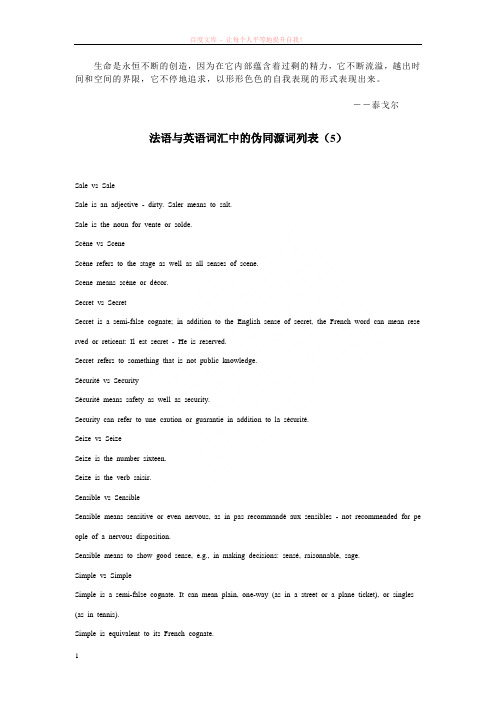
生命是永恒不断的创造,因为在它内部蕴含着过剩的精力,它不断流溢,越出时间和空间的界限,它不停地追求,以形形色色的自我表现的形式表现出来。
--泰戈尔法语与英语词汇中的伪同源词列表(5)Sale vs SaleSale is an adjective - dirty. Saler means to salt.Sale is the noun for vente or solde.Scène vs SceneScène refers to the stage as well as all senses of scene.Scene means scène or décor.Secret vs SecretSecret is a semi-false cognate; in addition to the English sense of secret, the French word can mean rese rved or reticent: Il est secret - He is reserved.Secret refers to something that is not public knowledge.Sécuritévs SecuritySécuritémeans safety as well as security.Security can refer to une caution or guarantie in addition to la sécurité.Seize vs SeizeSeize is the number sixteen.Seize is the verb saisir.Sensible vs SensibleSensible means sensitive or even nervous, as in pas recommandéaux sensibles - not recommended for pe ople of a nervous disposition.Sensible means to show good sense, e.g., in making decisions: sensé, raisonnable, sage.Simple vs SimpleSimple is a semi-false cognate. It can mean plain, one-way (as in a street or a plane ticket), or singles (as in tennis).Simple is equivalent to its French cognate.Situation vs SituationSituation is a semi-false cognate. In addition to situation, it can refer to location or position.Situation refers to situation or conjoncture.Social vs SocialSocial is a semi-false cognate. In addition to the English sense, it often refers to the world of industrial or labor relations: partenaires sociaux - management and labor.Social describes someone/something that enjoys the company of others: a social creature - une créature s ociale.Son vs SonSon is the third person singular possessive adjective as well as the French noun for sound.Son is the English word for fils.Sortir vs SortSortir means to go out or to leave.Sort as a verb means classer, trier, or séparer, while the noun means genre or espèce.Source vs SourceSource is a semi-false cognate. In addition to source, it can refer to a spring (source of water).Source is une source or une origine.Souvenir vs SouvenirSouvenir is a semi-false cognate. In addition to the English sense, it is the French verb "to remember" a s well as a noun for memory, recollection, and remembrance.Souvenir is a keepsake or memento.Spécial vs SpecialSpécial is a semi-false cognate. In addition to special, it can mean strange: Elle est très spéciale - She is very peculiar.Special refers to something out of the ordinary: a special event - un événement spécial.Spectacle vs SpectacleSpectacle refers to any sort of exhibition: un spectacle de danse - a dance performance or to something t hat others can watch: le spectacle de la rue - the bustle on the street.Spectacle is a semi-false cognate. It can mean an exhibition, but is usually used with a negative connotat ion: you made a spectacle of yourself - tu t'es donnéen spectacle. Spectacles is the British English wordfor lunettes.Sportif vs SportiveSportif refers to something related to sports: un journal sportif - a sports magazine or someone who is f ond of sports: un homme sportif - an athletic man.Sportive means playful or merry - folâtre, badin.Stable vs StableStable means stable, steady, or unmoving.Stable is a semi-false cognate. In addition to meaning the adjective stable, it can be the noun écurie. Stage vs StageStage is an internship or training period.Stage is une scène, le théâtre, un estrade, or une étape.Store vs StoreStore refers to a blind, shade, or awning.Store is any sort of magasin or provision as well as the verb mettre en réserve or conserver.Suit vs SuitSuit is from the verb suivre - to follow.Suit can be a noun - costume, tailleur, tenue, etc. or a verb - convenir à.Supplier vs SupplierSupplier is the verb to beseech or implore.Supplier is a noun for one who supplies - fournisseur.Supporter vs SupportSupporter means to support or hold up, as well as to endure or put up with something.Support means all of these things, but in the sense of enduring something, soutenir is the more common translation.Thévs TheThémeans tea.The is the definite article le, la, or les.Tirer vs TireTirer means to pull.Tire as a verb means fatiguer or lasser, as a noun it means un pneu.Trépasser vs TrespassTrépasser means to pass away.Trespass means to invade another's property: s'introduire sans permission.Truc vs TruckTruc refers to an unnamed or unknown object: thing, trick, thingamajig.Truck is a heavy motor vehicle for carrying things: un camion.Truculent vs TruculentTruculent means vivid, colorful, racy, larger than life, etc.Truculent describes someone who is aggressive or predisposed to fight: brutal, aggressif.Ultérieur vs UlteriorUltérieur means later or subsequent: la séance est reportée àune date ultérieure - the meeting is postpon ed to a later date.Ulterior is followed by motive, meaning a hidden or secret purpose: he had an ulterior motive - il avait un motif secret.Usuel vs UsualUsuel means ordinary, everyday, or common.Usual is slightly different: it leans more toward typical or normal - habituel or courant.Vent vs VentVent is the noun wind.Vent can refer to any of the following: un orifice, un conduit, un tuyau, une cheminée, un trou, une fent e.Vexévs VexedVexémeans hurt, upset, or offended, while Vexed means angry - fâché.Vie vs VieVie is the French word for life: C'est la vie - That's life.Vie means to struggle or fight: I struggled with him for the gun - J'ai luttéavec lui pour le pistolet. Volatil(e) and Volatile vs VolatileVolatil(e) means volatile when referring to a chemical. It can also mean fleeting: une valeur volatile - a fleeting value. Une volatile is a bird or other winged creature.Volatile can only be translated by volatil(e) in the chemistry lab. A volatile situation - une situation explosive. A volatile person - une personne versatile.Waters vs WatersWaters is one of many words for a bathroom: oùse trouvent les waters ? - where is the bathroom? Wat ers is simply the plural of water - eau.。
外来词法语词
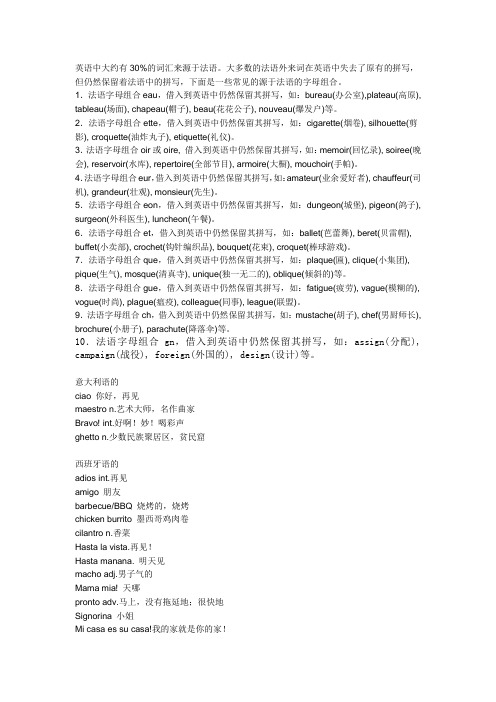
英语中大约有30%的词汇来源于法语。
大多数的法语外来词在英语中失去了原有的拼写,但仍然保留着法语中的拼写,下面是一些常见的源于法语的字母组合。
1.法语字母组合eau,借入到英语中仍然保留其拼写,如:bureau(办公室),plateau(高原), tableau(场面), chapeau(帽子), beau(花花公子), nouveau(爆发户)等。
2.法语字母组合ette,借入到英语中仍然保留其拼写,如:cigarette(烟卷), silhouette(剪影), croquette(油炸丸子), etiquette(礼仪)。
3.法语字母组合oir或oire, 借入到英语中仍然保留其拼写,如:memoir(回忆录), soiree(晚会), reservoir(水库), repertoire(全部节目), armoire(大橱), mouchoir(手帕)。
4.法语字母组合eur,借入到英语中仍然保留其拼写,如:amateur(业余爱好者), chauffeur(司机), grandeur(壮观), monsieur(先生)。
5.法语字母组合eon,借入到英语中仍然保留其拼写,如:dungeon(城堡), pigeon(鸽子), surgeon(外科医生), luncheon(午餐)。
6.法语字母组合et,借入到英语中仍然保留其拼写,如:ballet(芭蕾舞), beret(贝雷帽), buffet(小卖部), crochet(钩针编织品), bouquet(花束), croquet(棒球游戏)。
7.法语字母组合que,借入到英语中仍然保留其拼写,如:plaque(匾), clique(小集团), pique(生气), mosque(清真寺), unique(独一无二的), oblique(倾斜的)等。
8.法语字母组合gue,借入到英语中仍然保留其拼写,如:fatigue(疲劳), vague(模糊的), vogue(时尚), plague(瘟疫), colleague(同事), league(联盟)。
对英语词汇中源自法语的外来部分的一点研究
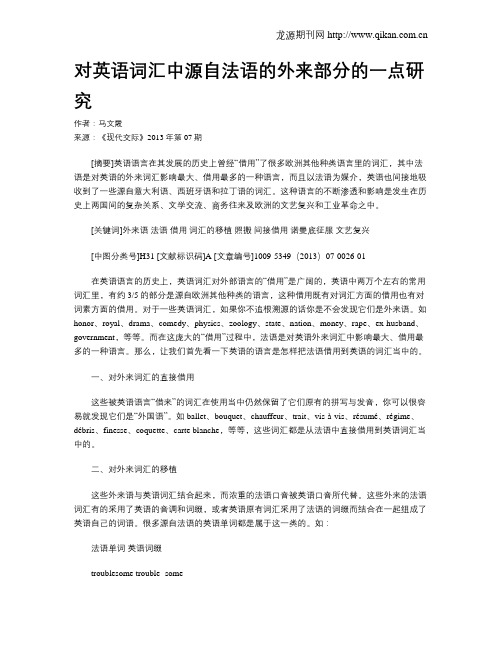
对英语词汇中源自法语的外来部分的一点研究作者:马文霞来源:《现代交际》2013年第07期[摘要]英语语言在其发展的历史上曾经“借用”了很多欧洲其他种类语言里的词汇,其中法语是对英语的外来词汇影响最大、借用最多的一种语言,而且以法语为媒介,英语也间接地吸收到了一些源自意大利语、西班牙语和拉丁语的词汇。
这种语言的不断渗透和影响是发生在历史上两国间的复杂关系、文学交流、商务往来及欧洲的文艺复兴和工业革命之中。
[关键词]外来语法语借用词汇的移植照搬间接借用诺曼底征服文艺复兴[中图分类号]H31 [文献标识码]A [文章编号]1009-5349(2013)07-0026-01在英语语言的历史上,英语词汇对外部语言的“借用”是广阔的,英语中两万个左右的常用词汇里,有约3/5的部分是源自欧洲其他种类的语言,这种借用既有对词汇方面的借用也有对词素方面的借用。
对于一些英语词汇,如果你不追根溯源的话你是不会发现它们是外来语。
如honor、royal、drama、comedy、physics、zoology、state、nation、money、rape、ex-husband、government,等等。
而在这庞大的“借用”过程中,法语是对英语外来词汇中影响最大、借用最多的一种语言。
那么,让我们首先看一下英语的语言是怎样把法语借用到英语的词汇当中的。
一、对外来词汇的直接借用这些被英语语言“借来”的词汇在使用当中仍然保留了它们原有的拼写与发音,你可以很容易就发现它们是“外国语”。
如ballet、bouquet、chauffeur、trait、vis-à-vis、résumé、régime、débris、finesse、coquette、carte blanche,等等,这些词汇都是从法语中直接借用到英语词汇当中的。
二、对外来词汇的移植这些外来语与英语词汇结合起来,而浓重的法语口音被英语口音所代替。
法语与英语词汇语法的相同点实证分析-法语论文-语言学论文
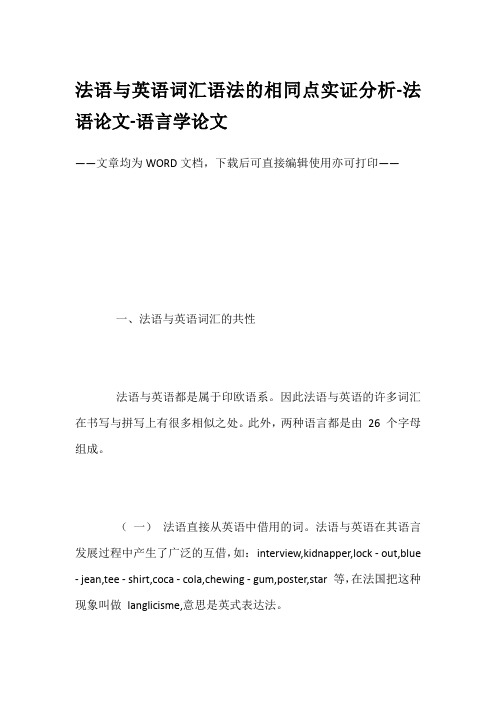
法语与英语词汇语法的相同点实证分析-法语论文-语言学论文——文章均为WORD文档,下载后可直接编辑使用亦可打印——一、法语与英语词汇的共性法语与英语都是属于印欧语系。
因此法语与英语的许多词汇在书写与拼写上有很多相似之处。
此外,两种语言都是由26 个字母组成。
(一)法语直接从英语中借用的词。
法语与英语在其语言发展过程中产生了广泛的互借,如:interview,kidnapper,lock - out,blue - jean,tee - shirt,coca - cola,chewing - gum,poster,star 等,在法国把这种现象叫做langlicisme,意思是英式表达法。
(二)法语与英语语义与拼写相同的词。
法语与英语的单词60%左右是极其相近的,无论语义还是拼写完全一样的单词很多,如:mission,menu,minute,place,impression,mu-sique,transport,condition,po ssible,probable,important 等。
(三)以tion 结尾的词。
法英拼写与语义相同,一般表示行为或行动结果,如:composition,question,solution,station,ob-servation,imagination,inspirati on,destination,construction,pollu-tion,production 等。
(四)以ture 结尾的词。
法英拼写与语义相同,如:cul-ture,lecture,structure,agriculture,nature,future,creature,adven-ture,r upture 等。
(五)以ment 结尾的词。
法英拼写与语义相同,一般表示方式,如:monument,compliment,moment,instrument,docu-ment,element,argument 等。
英语中十大来自法语的词汇
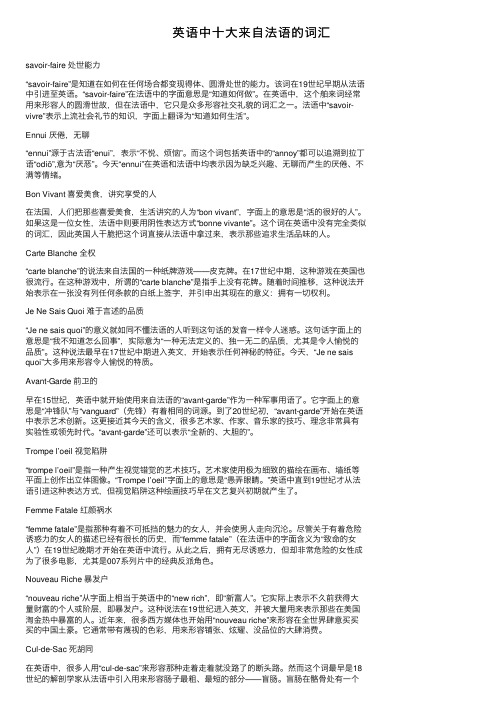
英语中⼗⼤来⾃法语的词汇savoir-faire 处世能⼒“savoir-faire”是知道在如何在任何场合都变现得体、圆滑处世的能⼒。
该词在19世纪早期从法语中引进⾄英语。
“savoir-faire”在法语中的字⾯意思是“知道如何做”。
在英语中,这个舶来词经常⽤来形容⼈的圆滑世故,但在法语中,它只是众多形容社交礼貌的词汇之⼀。
法语中“savoir-vivre”表⽰上流社会礼节的知识,字⾯上翻译为“知道如何⽣活”。
Ennui 厌倦,⽆聊“ennui”源于古法语“enui”,表⽰“不悦、烦恼”。
⽽这个词包括英语中的“annoy”都可以追溯到拉丁语“odiō”,意为“厌恶”。
今天“ennui”在英语和法语中均表⽰因为缺乏兴趣、⽆聊⽽产⽣的厌倦、不满等情绪。
Bon Vivant 喜爱美⾷,讲究享受的⼈在法国,⼈们把那些喜爱美⾷,⽣活讲究的⼈为“bon vivant”,字⾯上的意思是“活的很好的⼈”。
如果这是⼀位⼥性,法语中则要⽤阴性表达⽅式“bonne vivante”。
这个词在英语中没有完全类似的词汇,因此英国⼈⼲脆把这个词直接从法语中拿过来,表⽰那些追求⽣活品味的⼈。
Carte Blanche 全权“carte blanche”的说法来⾃法国的⼀种纸牌游戏——⽪克牌。
在17世纪中期,这种游戏在英国也很流⾏。
在这种游戏中,所谓的“carte blanche”是指⼿上没有花牌。
随着时间推移,这种说法开始表⽰在⼀张没有列任何条款的⽩纸上签字,并引申出其现在的意义:拥有⼀切权利。
Je Ne Sais Quoi 难于⾔述的品质“Je ne sais quoi”的意义就如同不懂法语的⼈听到这句话的发⾳⼀样令⼈迷惑。
这句话字⾯上的意思是“我不知道怎么回事”,实际意为“⼀种⽆法定义的、独⼀⽆⼆的品质,尤其是令⼈愉悦的品质”。
这种说法最早在17世纪中期进⼊英⽂,开始表⽰任何神秘的特征。
今天,“Je ne sais quoi”⼤多⽤来形容令⼈愉悦的特质。
- 1、下载文档前请自行甄别文档内容的完整性,平台不提供额外的编辑、内容补充、找答案等附加服务。
- 2、"仅部分预览"的文档,不可在线预览部分如存在完整性等问题,可反馈申请退款(可完整预览的文档不适用该条件!)。
- 3、如文档侵犯您的权益,请联系客服反馈,我们会尽快为您处理(人工客服工作时间:9:00-18:30)。
法语与英语词汇中的伪同源词列表(1)◆ Décevoir vs DeceiveDécevoir means to disappoint: Il va te décevoir - He's going to disappoint you.To deceive means to deliberately trick or lead someone astray: I didn't mean to deceive you - Je n'avais pas l'intention de te tromper.◆ Défaut vs DefaultDéfaut is a flaw, fault, drawback, or lack.Default is un défaut in judiciary proceedings. To default = manquer à ses engagements or prendre une valeur par défaut.◆ Défi vs DefyDéfi is a noun: defiance or challenge.Defy is the verb défier or braver.◆ Défiler vs DefileDéfiler means to march past: les visiteurs défilaient devant le musée - the visitors marched past the museum and it can mean to unthread (a needle): Je dois défiler l'aiguille - I need to unthread the needle.To defile is to dirty or deface something or to ruin someone's name: It's wrong to defile a great man - C'est mal de profaner un grand homme.◆ Délai/Délayer vs DelayDélai is a time limit or deadline: dans un délai de 15 jours - within two weeks. Délayer means to water down or thin down, as in cooking or mixing paint.Delay has a slightly negative connotation - it indicates that the time was unexpected and is usually translated by "retard" : They arrived with an hour's delay - Ils sont arrivés avec une heure de retard.◆ Demander vs DemandDemander means to ask for: Il m'a demandé de chercher son pull - He asked me to look for his sweater. However, the French noun demande does correspond to the English noun demand.(to) Demand is usually translated by exiger: He demanded that I look for his sweater - Il a exigé que je cherche son pull.◆ Détail vs DetailDétail is a semi-false cognate. In addition to detail, it can refer to retail.Detail means détail or renseignements.◆ D ire vs DireDire means to say or to tell.Dire is an adjective which means affreux, terrible, or extrême.◆ Divers vs DiversDivers means diverse, varied, or several.Divers is the plural of diver - plongeur.◆ Douche vs Doucheune Douche is a shower, while Douche refers to a method of cleaning a body cavity with air or water: lavage interne.◆ Draguer vs DragDraguer informally means to flirt. Formally, it means to fish with a dragnet or to dredge.Drag means traîner or tirer.◆ Émerg ence vs EmergencyÉmergence is the equivalent of the English words emergence or source.Emergency is un cas urgent or un imprévu.◆ Engagement vs EngagementEngagement is any agreement, commitment, promise, or obligation.Engagement usually refer s to les fiançailles.◆ Entrée vs EntréeEntrée is another word for hors-d'oeuvre; an appetizer.Entrée refers to the main course of a meal: le plat principal.◆ Envie vs EnvyAvoir envie de means to want or to feel like something: Je n'ai pas envie de travailler - I don't want to work (feel like working). The verb envier, however, does mean to envy.Envy means to be jealous or desirous of something belonging to another. The French verb is envier: I envy John's courage - J'envie le courage à Jean.◆ Étiquette vs EtiquetteÉtiquette is a semi-false cognate. In addition to etiquette or protocole, it can be a sticker or label.Etiquette can mean étiquette, convenances, or protocole.◆ Éventuel vs EventualÉventuel means possible: le résultat éventuel - the possible outcome.Eventual describes something that will happen at some unspecified point in the future; it can be translated by a relative clause like qui s'ensuit or qui a résulté or by an adverb like finalement.◆ Éventuellement vs EventuallyÉventuellement means possibly, if need be, or even: Vous pouvezéventuellement prendre ma voiture - You can even take my car / You can take my car if need be.Eventually indicates that an action will occur at a later time; it can be translated by finalement, à la longue, or tôt ou tard : I will eventually do it - Je le ferai finalement / tôt ou tard.◆ Évidence vs EvidenceÉvidence is a semi-false cognate. In addition to evidence or the facts, it can mean obviousness, an obvious fact, or prominence.Evidence means évidence, témoignage, or preuve.◆ Évident vs EvidentÉvident usually means evident or obvious, but there is a familiar expression that always catches me: ce n'est pas évident - it's not that simple.E vident means évident or manifeste.◆ Expérience vs ExperienceExpérience is a semi-false cognate, because it means both experience and experiment: J'ai fait une expérience - I did an experiment. J'ai eu une expérience intéressante - I had an interesting experience.Experience can be a noun or verb refering to something that happened. Only the noun translates into expérience : Experience shows that ... - L'expérience démontre que... He experienced some difficulties - Il a rencontré des difficultés.◆Expérimenter vs ExperimentExpérimenter is a semi-false cognate. It is equivalent to the English verb, but also has the added sense of to test an apparatus.Experiment as a verb means to test hypotheses or ways of doing things. As a noun, it is equiva lent to the French word expérience (see above).◆ Fabrique vs FabricFabrique is a factory. De bonne fabrique means good workmanship.Fabric is equivalent to tissu or étoffe. When speaking figuratively, e.g., the fabric of society, the French word is structure.◆ Facilité vs FacilityFacilité means ease, easiness, ability, or aptitude.Facility is a semi-false cognate. It usually refers to a structure that serves a particular function, although it can mean easiness, aptitude, etc.◆ Façon vs F ashionFaçon means way, as in voilà la façon dont il procède - this is the way he does it. It can be translated by fashion when it is synonymous with way or manner, as in à ma façon - in my fashion or my way.Fashion is a style or custom, usually in clothing: mode or vogue. For all of you apple pie eaters out there, now you know that à la mode really means in fashion.◆ Fastidieux vs FastidiousFastidieux means tedious, tiresome, or boringFastidious means attentive to detail or exacting: minutieux,méticuleux, tatillon.◆ Fendre vs FendFendre means to split or to chop.Fend is se débrouiller, to fend off means parer or détourner.◆ Figure vs FigureFigure is a semi-false cognate. It is the French word for face, but can also refer to an illustrated or mathematical figure.Figure refers to numbers chiffres as well as to the form of a person's body: forme, silhouette.◆ File/Filer vs FileFile is a line or queue. Filer means to spin (e.g., cotton or thread) or to prolong.File can refer to une lime (as well as the verb limer), un dossier, or un classeur (and the verb classer).◆ Film vs FilmFilm refers to a movie.Film can mean un film as well as la pellicule.。
